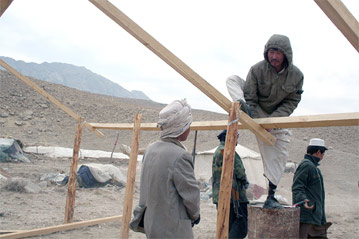Pakistan earthquake return update
Pakistan earthquake return update
More than six months on, with the emergency phase of the Pakistan earthquake operation coming to an end and following the government's announcement that relief camps would start closing in March, quake survivors continue returning home at a steady pace. Some 100,000 camp dwellers have returned to rebuild their homes in the last month, and 57 camps have closed. About 55,000 people remain in some 99 camps.
To support the trend of returns, UNHCR has provided US$2.25 million to support the International Organization for Migration's (IOM) efforts to facilitate the voluntary, safe and dignified return of internally displaced persons from relief camps in Pakistan's earthquake-affected areas to their home villages. Under an agreement signed last month, UNHCR will fund a significant portion of IOM's part of the UN Action Plan to provide medical screening and transport facilities to quake survivors. The project will run from April to the end of August.
Inevitably, there will be some vulnerable people who cannot go home immediately for various reasons. Some have been orphaned, widowed or disabled; others have lost their land or come from towns like Balakot, which lies on major fault lines and has to be relocated. It is extremely important that these vulnerable people continue to be assisted until more permanent solutions are found for them.
In North West Frontier Province (NWFP), the authorities have set aside three camps (Siran Sialkot, Gari Habibullah and Meira) for residual groups of vulnerable people. In Pakistan-Administered Kashmir (AJK), at least two camps (Thori Park, and Mera Tanolia) have been designated for this purpose.
UNHCR is providing resources (cars, office equipment) and training (camp management) to the civilian authorities - Regional Relief Coordinator (RRC) and Camp Management Organization (CMO) - to help them manage and assist the residual groups in these camps.
We're also looking to empower the people themselves. Since February, we've funded the International Catholic Migration Commission (ICMC) to conduct vocational training programmes in some camps, targeting Extremely Vulnerable Individuals in particular. Through courses like sewing, embroidery, plumbing and masonry, we hope to help them become more self-reliant upon return to their villages.








